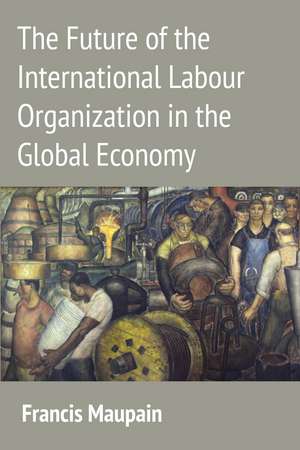The Future of the International Labour Organization in the Global Economy
Autor Francis Maupainen Limba Engleză Hardback – 22 oct 2013
Preț: 541.20 lei
Preț vechi: 774.49 lei
-30% Nou
Puncte Express: 812
Preț estimativ în valută:
103.57€ • 106.100$ • 86.20£
103.57€ • 106.100$ • 86.20£
Carte tipărită la comandă
Livrare economică 25 martie-08 aprilie
Preluare comenzi: 021 569.72.76
Specificații
ISBN-13: 9781849465021
ISBN-10: 1849465029
Pagini: 320
Dimensiuni: 156 x 234 x 20 mm
Greutate: 0.59 kg
Ediția:New.
Editura: Bloomsbury Publishing
Colecția Hart Publishing
Locul publicării:London, United Kingdom
ISBN-10: 1849465029
Pagini: 320
Dimensiuni: 156 x 234 x 20 mm
Greutate: 0.59 kg
Ediția:New.
Editura: Bloomsbury Publishing
Colecția Hart Publishing
Locul publicării:London, United Kingdom
Caracteristici
This book considers the relevance of the founding institutional principles of the International Labour Organization in today's context.The author spent most of his professional career at the ILO and so offers an unrivalled inside view on the state of the ILO today as well as its possible future.A valuable study for all those with an interest in the ILO as well as anyone who studies international organization, labour law, law and society or political economy.
Notă biografică
Francis Maupain, who holds a PhD in law from the Sorbonne, an LLM from Harvard Law School and an MPA from Harvard JFK School of Government, spent most of his professional career at the ILO, first as Legal Counsel and more recently as Special Adviser to the Director-General. During this time he has written and lectured extensively on the capacity of the oldest organisation in the UN system to meet the various challenges it faces as a result of changes in the world of labour, the global economy, and the international system.
Cuprins
Introduction: Whither the ILO's Second Century? Persuasion at its Limits in the Global Economy I. The (false) dilemma: survival or integrity II. The real challenge: are 100-year-old institutional choices still valid in the twenty-first century? III. The core issue Part I Ninety Years of Transformations in the International System: Challenges Posed to ILO Persuasiveness1. The Cold War and the trente glorieuses, a Not-Quite Golden Age for the ILO and its Persuasiveness 2. Globalisation Ascendant: The ILO's raison d'être Restored - But the Gamble on Persuasion Nearly Lost I. Two decades of recurrent social disappointments and the corresponding demand for greater social regulation II. Which puts into question its capacity to meet the demand through the 'traditional' normative strategy 3. Have Recent Efforts at Institutional Renewal Already Fallen Behind the Pace of Change in the Economic Environment? I. A renewal in four stages II. Have the consequences of the financial crisis rendered the renewal old news? Part II The Proliferation of Multilateral Actors and the Challenge of Coherence4. Social Goals: Doomed to Remain 'Country Cousins' of Economic Objectives at the Universal Level? I. From the pre-war marginalisation of the ILO's social objectives to the Declaration of Philadelphia's failed attempt at a hostile takeover II. The 'mandated' segregation of social considerations in the (former?) practice of the World Bank 5. Employment: Functional 'Common Ground' or Policy Fault-line? I. Employment: free-standing policy objective or economic windfall? II. The evolving employment dilemma: quantity vs quality III. The financial crisis: an (as yet) unexploited opportunity to give social objectives their due 6. Boosting the ILO's Capacity to Promote Coherence I. Promoting state-level coherence II. Pursuing coherence through inter-organisational dialogue III. Actively supporting the emergence of a relevant 'Epistemic Community' Part III ILO Influence and the Enduring Demand for Universal'Rules of the Game'7. From the Impasse of the Social Clause Debate to the Delimitation of Fundamental Rights at Work as Shared 'Rules of the Game' I. From the misleading analogy of 'social dumping' II. Or ambiguous references to 'internationally recognised worker rights' III. To the ILO's functionalist approach, turning on 'fundamental rights as enabling rights' (and as potential rules of the game) 8. Can the Social 'Rules of the Game' be Made More Effective by Linking Them to Basic Trade Rules? I. Legitimacy, perceptions and barriers to a possible legal transplant II. Reading between the lines: from a formal marriage of trade rules and labour rights to a possible (clandestine) liaison? 9. Decentralised Linkages: A Mixed Blessing for the ILO?I. A mixed blessing from the viewpoint of implementing ILO standards and procedures II. A limited 'enforcement' blessing for workers III. Conclusion: Is there more to the phenomenon than meets the eye? Part IV The 'Market for Social Justice' to the Rescue of The ILO's Persuasive Capacities?10. A Lopsided 'Market for Social Justice' Calling for Public Involvement I. Consumer preferences to the rescue of failing state resolve II. Public supply of information to overcome market failure 11. Meeting Transnational Demand with a Transnational Supply: A Jointly Established Labelling System I. From the difficulties of 'labelled at destination' to the possibilities of 'labelled at the origin' II. Need for a multilateral system of mutual recognition and impartial verification III. To guarantee what? Effective application by each party of legislation satisfying agreed international labour standards IV. In conclusion: Is there a market for a market-based approach to social justice? Conclusion: Reinventing the ILO? I. Three necessary and feasible aspects of an institutional reinvention II. Which requires mobilising all actors and drawing on its full array of transformative powers III. And widening the horizon of social justice
Recenzii
Maupain brings just enough cynicism to his vast knowledge of the international labour realm to present useful prescriptions for change. The depth and breadth of his discussion make this an essential text for scholars and advanced students writing on the history and possible futures of the ILO, and no doubt the ideas for change will provoke productive discussion.
Descriere
As the oldest organization in the UN system, approaching its 100th birthday in 2019, the ILO faces unprecedented strains and challenges. The book forms part of a broader inquiry into the relevance of founding institutional principles to today's context
